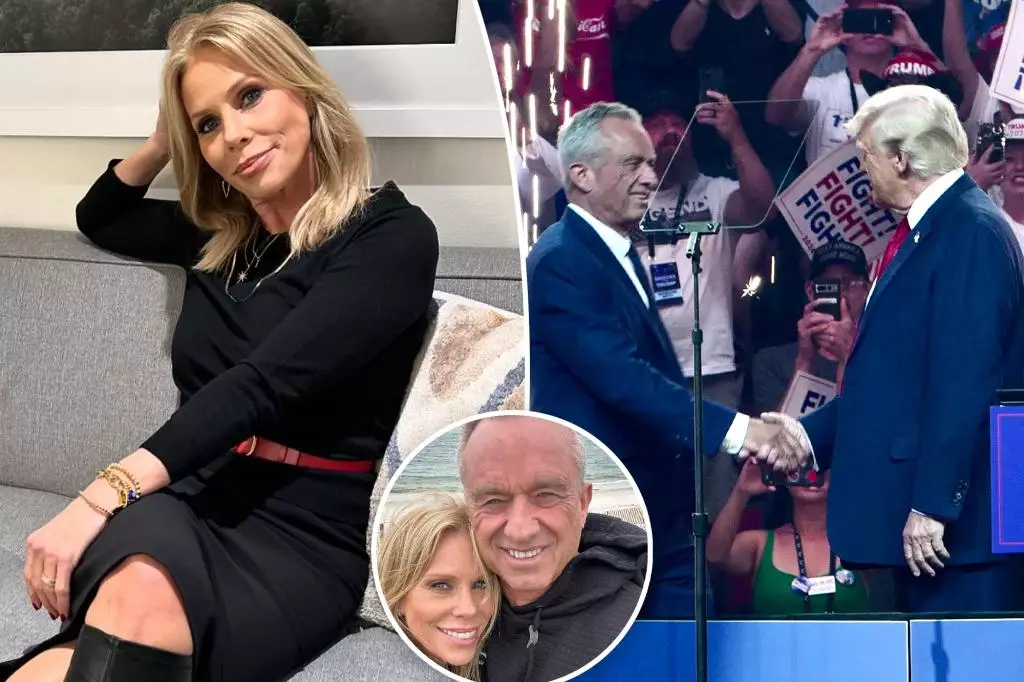The relationship between Cheryl Hines and Robert F. Kennedy Jr. appears to be on shaky ground, with whispers of an impending divorce stemming from a confluence of personal and political disagreements. While some may speculate that the crux of their issues lies in Kennedy’s relationship with journalist Olivia Nuzzi, reliable sources indicate that Hines is more significantly troubled by her husband’s alignment with the Republican Party, specifically his endorsement of former President Donald Trump, a decision that starkly contrasts with her long-held Democratic values.
Shifting Political Loyalties and Personal Fallout
Kennedy, who famously hails from a lineage steeped in Democratic politics, has made headlines by endorsing Trump, an action many find perplexing given his family’s storied history. This about-face raises legitimate questions about his integrity and commitment to the values that once defined the Kennedy clan. For Hines, a committed Democrat, this change in allegiance seems to resonate much deeper than the revelation of Kennedy’s alleged infidelity with Nuzzi. Sources suggest that while she may have anticipated some personal challenges in marrying someone known as a “serial philanderer,” the move toward Trump’s political sphere represents a betrayal of her core beliefs.
Reports indicate that Hines is both “embarrassed” and “furious” about the ongoing scandal between Kennedy and Nuzzi. It appears that the former actress had believed she was marrying a man who was finally ready to settle down and prioritize their life together, leaving behind the notorious womanizing of his youth. Her heartbreak now stems not only from his infidelity but from feeling blindsided by a shift in both his personal and political integrity.
Recent revelations concerning Kennedy’s alleged texting relationship with Nuzzi have only exacerbated tensions within the marriage. Described as “incredible” FaceTime exchanges and declarations of love blur the lines of infidelity, potentially marking a significant emotional betrayal for Hines. This affair, which emerged after Nuzzi wrote a profile on Kennedy, has become increasingly public, highlighting a cycle of betrayal that threatens to dismantle both his marriage and his reputation.
As the media firestorm grows, sources close to the situation claim that Kennedy has denied his relationship with Nuzzi, even hinting at possible legal action against her. This defiance complicates the narrative, suggesting a strategic avoidance of accountability that may ultimately further alienate Hines. Given that Hines has already been spotted without her wedding ring, there is a growing public speculation about the finality of their union.
Intriguingly, the dynamics within Kennedy and Hines’ marriage emphasize a broader tension between personal relationships and political identity. A source has claimed that some factions within Trump’s camp have expressed animosity toward Hines, especially with her strong Democratic principles, possibly complicating Kennedy’s position should he continue to entrench himself within Trump’s administration. As Kennedy’s political ambitions grow, the pressure on Hines to conform or withdraw increases, potentially creating a chasm that is difficult to bridge.
Hines initially displayed support for Kennedy’s political ambitions, yet the reality of endorsing Trump appears to clash violently with her values. She may have hoped that her partnership with Kennedy would yield a personal political identity separate from the controversies of his historically libertine lifestyle. Her current predicament forces her to confront the stark realization that she is not merely a bystander in her husband’s political machinations but an inherent part of a public narrative that she never signed up for.
As this personal and political saga continues to unfold, many are left wondering about the future of Hines and Kennedy’s marriage. Despite the tension and betrayal, sources suggest that reconciliation may still be possible, but only if Kennedy addresses not only his marital infidelities but also his political deviations. The road ahead will likely require introspection and recalibration on both sides.
With Hines feeling cornered and betrayed, the resolution to this dilemma remains uncertain. It serves as a cautionary tale of how the intersections of personal relationships and political ideologies can complicate lives in unexpected and tumultuous ways. The potential divorce not only embodies a personal tragedy but also signifies a larger commentary on the complexities of love, loyalty, and the impact of political affiliations in the modern age.
